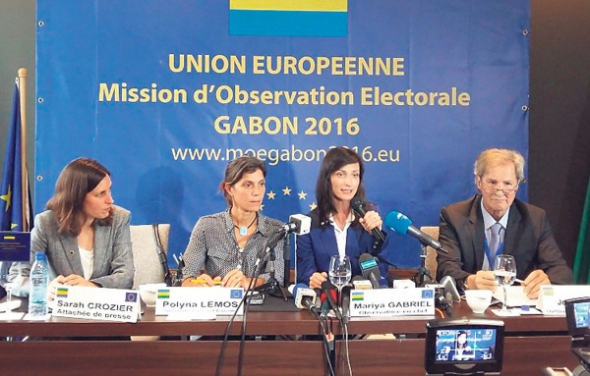Nigeria’s February 25 presidential election marred by multiple failures, says EU Observer Mission
By Jude-Ken Ojinnaka
The European Union Election Observer Mission (EU EOM) has stated in their final report that the Nigeria 2023 February 25 and March 18 poll were marred due to multiple failures by the Independent National Electoral Commission (INEC).
In its appraisal on the presidential election of February 25, the EU said the operational failures on the part of INEC were due to operational deficiencies and lack of transparency, amongst others.
The EU chief observer and head of the delegation, Barry Andrews, made the position of the Observer Mission known in a media conference in Abuja while presenting its final report on the election.
Barry Andrews said, “the election exposed enduring systemic weakness and therefore signal a need for further legal and operational reforms to enhance transparency, inclusiveness, and accountability”.
He however said that the Mission observed improvements in the conduct of the election, especially the deployment of technology such as the Bimodal Voter Accreditation System (BVAS) and the INEC Results Viewing Portal (IReV), but decried that the 2023 general election did not ensure a well-run transparent and inclusive democratic process as assured by the INEC.
“Early in the process, while enjoying a broad stakeholder trust, INEC introduced a series of positive measures to strengthen the conduct of the elections. However, closer to the polls some started to doubt INEC’s administrative and operational efficiency and in-house capacity.
“Public confidence gradually decreased and was severely damaged on 25 February due to its operational failures and lack of transparency. While some corrective measures introduced before the March 18 elections were effective, overall trust was not restored”, Barry Andrews pointed out.
He explained that the introduction of Bimodal Voter Accreditation System (BVAS) and the INEC Results Viewing Portal (IReV) was widely seen as an important step to ensure the integrity and credibility of the elections.
He noted that in practice, multiple missteps and lack of transparency before the polls, compounded by severely delayed display of the presidential result forms, dashed the public trust in election technologies used.
“INEC failed to give a timely and comprehensive explanation for the failures of 25 February , hence the improved online display of results forms from the 18 March State elections just fuelled further speculations about what exactly caused the delays after the presidential poll.
“On February 25 voting was critically delayed by the late arrival of sensitive materials and, during the early stages of the collation, presidential results form from polling units were not displayed real-time on the IRev as committed by the INEC and anticipated by all stakeholders.
“A critical failure in the entire election process manifested at the collation stage on 25 February, due to widespread disorganisation, lack of adherence to the prescribed procedures and an unsuitable environment. By the time of the declaration of presidential results, one quarter of the results forms were still missing from the IReV, and a significant percentage of the forms uploaded on IReV, often needed for comparison with manual results, were not legible.”
The Observer Mission made six important recommendations which include efforts to remove ambiguities in the law; establish a publicly accountable selection process for INEC members; ensure real-time publication of access to election results; provide greater protection for media practitioners; address discrimination against women in political life and punish impunity regarding electoral offenses.
However, reacting to the EU, INEC defended the conduct of the 2023 polls, insisting that irrespective of the challenges, there were many positives in the election, even as it assured that the Commission was going to harmonise the EU recommendations with that of other election observers.
INEC Commissioner of voter education, Festus Okoye, said, “Even from the reports presented, you can see that the EU made mention of the fact that there has been significant improvement in our electoral process and there have been so many positives in this election.
“You heard one of the positives that we registered over 93 million Nigerians during this election. Not only that, if you look at all the reports that have been submitted you can see that in all the reports, domestic and international observers attested to the facts that in terms of voter accreditation, the BVAS performed optimally. So, there is no issue with the BVAS.
“Second, in terms of the Senatorial election, in term of the House of the Representatives elections, the governorship election and also in terms of the State houses of assembly election, you can see that almost all the domestic and international observers made mention of the fact that there were significant improvements in the conduct and management of the elections.” Okoye explained.











